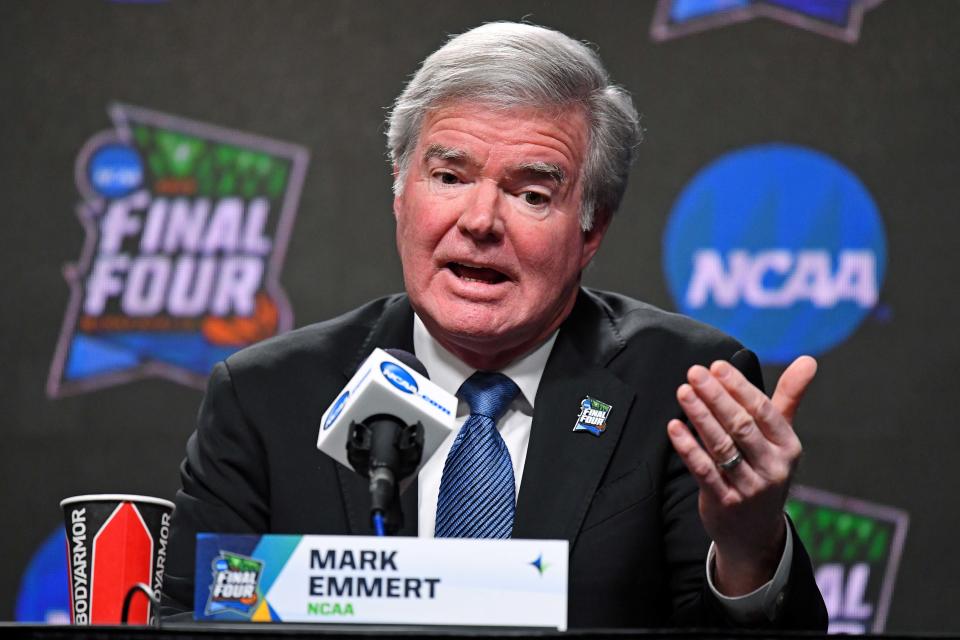NCAA President Mark Emmert non-committal about blanket waiver for NIL in 2021-22, Iowa's Jordan Bohannon says
- Oops!Something went wrong.Please try again later.
- Oops!Something went wrong.Please try again later.
Four college basketball players representing the #NotNCAAProperty movement spent about 50 minutes on Zoom on Tuesday night with NCAA President Mark Emmert. They left the meeting disappointed over the responses they heard from Emmert surrounding name, image and likeness.
The athletes on the call — men’s basketball players Geo Baker of Rutgers and Jordan Bohannon of Iowa, and women’s basketball players Caitlin Clark of Iowa and Akienreh Johnson of Michigan — were requesting an endorsement from Emmert for the NCAA to issue a blanket waiver for NIL for the 2021-22 academic year. The request was made in large part because four states — Alabama, Florida, Mississippi and New Mexico — have passed laws that would allow college athletes to earn money from non-university sources (such as endorsement deals or camps) using their name, image and likeness beginning July 1.
However, Bohannon — who spoke to the Des Moines Register after the meeting — characterized Emmert’s response as non-committal.
“He kept reiterating that he wanted Congress to make a decision,” Bohannon said. “I was very direct with him, saying that I think we both know Congress won’t act with it and the longer we wait, the more complex issue this becomes (July 1).”

Bohannon said that when he asked Emmert what would happen after July 1 if athletes in those four states began making deals to profit off their name.
“He said he wouldn’t punish them,” Bohannon said. “I countered and asked what about the states that don’t have name, image and likeness? He really didn’t give much detail with that response. He said that he hoped something happened with Congress or the NCAA before that happens.”
Bohannon characterized the meeting as respectful but felt Emmert was talking down to the players at times. He did report the group was pleased with two developments – that Emmert affirmed his commitment to treating men’s and women’s athletes equally going forward, after disparities in the NCAA men’s and women’s basketball tournaments came to light in March; and that Emmert agreed to meet with the group again sometime in the next three weeks.
Bohannon was miffed that Emmert denied the group a request to meet with the NCAA’s Board of Governors. Bohannon said Emmert’s rationale was that athletes have never met with the Board of Governors, which is the NCAA’s top policy-making group. It is comprised of school presidents from all three of the association’s competitive divisions and five independent members. There are no athletes included.
The Portal: Five most impactful men's college basketball transfers so far in wild offseason
Recruiting: Chet Holmgren, consensus No. 1 men's college basketball recruit, selects Gonzaga
The NCAA’s Board of Governors and the Division I Board of Directors are scheduled to meet April 27 and 28, respectively. The Division I board is comprised mainly of presidents from schools at that level. It also includes one athlete representative.
Those governing panels seem likely to at least touch on the NIL issue when they meet. On April 1 in conjunction with the men’s Final Four, Emmert was asked what would happen if no action is taken by the association or Congress by July 1.
“We would go into a period in July that would be pretty chaotic, where we had some states that allowed it, some states that didn't allow it,” Emmert said then. “And in each of the states, there would be different policies around what was or wasn't permissible. So, between now and then, we'll have to make some decisions about what the schools want to do under those circumstances and how we adjust to that new reality. But our hope is that we can get a bill passed in Congress that preempts that chaotic circumstance.”
Bohannon said another reason he urged Emmert to take action was to assist other players like him who are considering whether or not to return to school with extra eligibility that was granted due to the COVID-19 pandemic. Bohannon has not yet made a decision whether to return to Iowa for a sixth season.
“If he just issued one blanket waiver," Bohannon said, "we feel like it would solve a lot of issues."
This article originally appeared on Hawk Central: NCAA President Mark Emmert meets with Jordan Bohannon, other athletes

